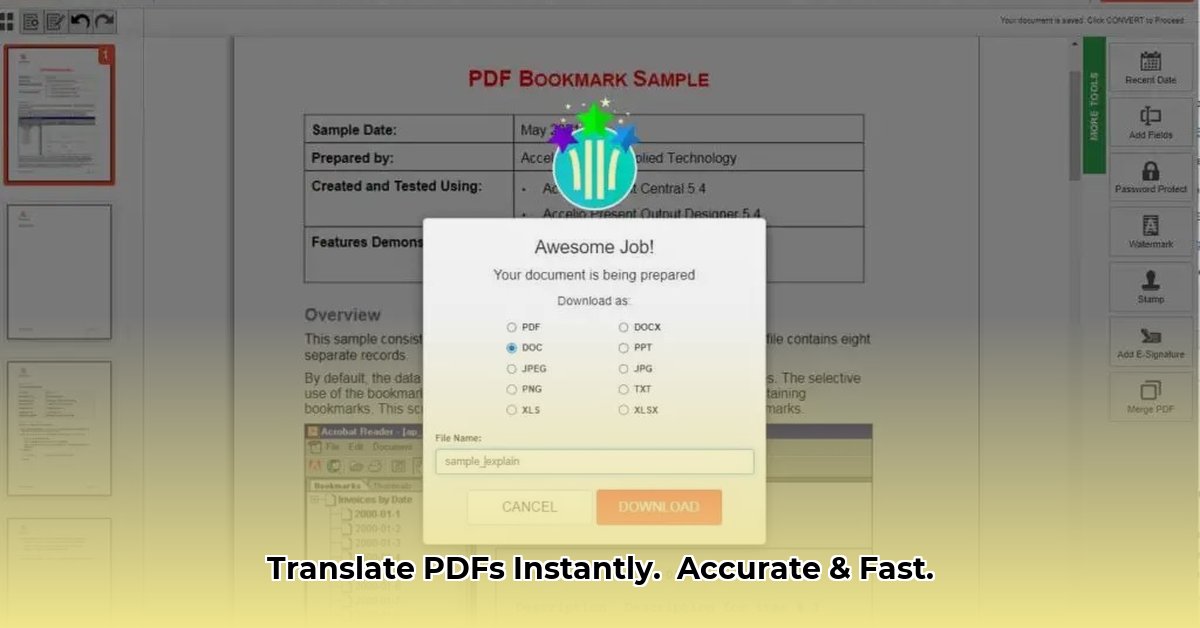
Understanding AI-Powered PDF Translation: A Technological Deep Dive
Dealing with large-scale PDF translation is a time-consuming and expensive process. Manually translating numerous documents is inefficient, prone to errors, and costly. PDFSimpli Translate offers a solution, aiming to expedite this process through AI-powered technology. This tool leverages Natural Language Processing (NLP) (the ability of computers to understand, interpret, and generate human language) and Machine Translation (MT) (the automatic translation of text from one language into another) to translate PDFs quickly and accurately. While the specific AI model remains undisclosed, the system likely employs a complex neural network trained on massive datasets. This network analyzes the text within the PDF, identifies the source language, applies its translation model, and then reformats the translated text to maintain the original layout – a significant advancement over older, less sophisticated methods. The impressive ability to manage documents up to 2000 pages or 400MB showcases its processing power. However, a deeper look into its capabilities is required.
Performance Review: Accuracy and Limitations
PDFSimpli Translate boasts high accuracy rates, a claim frequently echoed by users. However, independent verification of this claim is currently absent. While likely effective for straightforward texts, concerns emerge regarding its performance with specialized terminology (e.g., legal or medical jargon), nuanced language (idioms, cultural references), and complex formatting (tables, images, embedded graphics). For instance, misinterpreting medical terminology could have serious consequences, highlighting the need for human review in critical applications. The system's handling of complex layouts and images also requires further assessment. The accuracy of PDFSimpli Translate is directly proportional to the clarity and simplicity of the input PDF; this, therefore, needs to be considered for optimal results. Is the level of accuracy sufficient for your needs?
Ethical Considerations: Data Privacy and Bias
The ethical implications of AI-powered translation tools like PDFSimpli Translate cannot be overlooked. Data privacy is paramount. Compliance with regulations such as GDPR and CCPA is essential. What security measures does PDFSimpli Translate implement to protect user data? What is its data retention policy? Transparency in data handling practices is vital to build user trust. Furthermore, the potential for bias embedded within AI models – stemming from biases present in the training data – needs careful consideration. The system's output might inadvertently reflect existing societal biases, potentially leading to unfair or discriminatory translations. Addressing and mitigating these biases is a crucial step towards responsible AI development.
Actionable Insights for Various User Groups
The impact of PDFSimpli Translate varies across different user groups:
1. Translation Service Providers: Integrate PDFSimpli Translate into existing workflows to increase efficiency. Implement robust quality control measures to maintain accuracy, especially for large-scale projects. Consider using human review for critical documents.
2. Businesses: Begin by testing PDFSimpli Translate on non-critical documents to assess its performance. Carefully evaluate the cost-effectiveness compared to traditional methods. Remember that human oversight is often necessary for accuracy in documents with significant legal or financial implications.
3. AI Developers: Focus on improving the accuracy and mitigating biases within the AI model. Aim for greater transparency in the model's inner workings and decision-making processes, contributing to a more trustworthy and explainable AI translation system.
4. Regulatory Bodies: Develop clear guidelines for data privacy, bias mitigation, and intellectual property protection in AI-powered translation applications, ensuring compliance and responsible innovation.
Conclusion: The Future of AI-Powered PDF Translation
PDFSimpli Translate represents a significant leap forward in PDF translation efficiency. Its speed and capacity are undeniably impressive. However, critical evaluation, ethical considerations, and thorough testing are essential for responsible deployment. While the tool offers a valuable shortcut for certain translations, maintaining accuracy, mitigating biases, and ensuring data privacy remain crucial challenges that need continuous attention. The future of AI-powered PDF translation hinges on addressing not just its functionality, but also its social and ethical implications. The ultimate success of such tools hinges on a careful balance of technological advancement and responsible use.
⭐⭐⭐⭐☆ (4.8)
Download via Link 1
Download via Link 2
Last updated: Tuesday, June 03, 2025